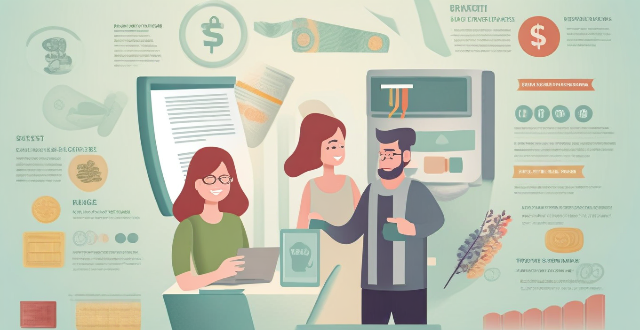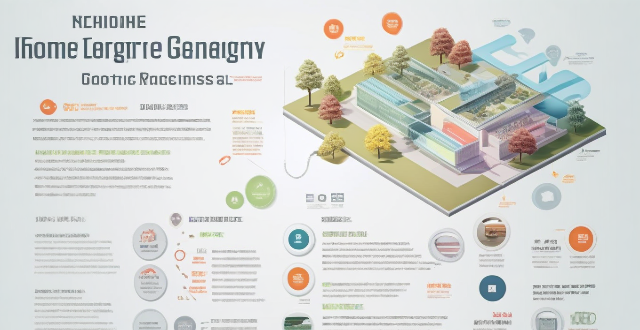Goal Saving

How do I start saving for retirement ?
Saving for retirement is a crucial aspect of financial planning. Here are some steps to start saving for your retirement: 1. Set a retirement goal based on factors like age, income, and expenses. 2. Create a budget that accounts for monthly expenses and income. 3. Start saving early to take advantage of compound interest. 4. Contribute regularly to a retirement account through automatic deposits. 5. Consider tax-advantaged accounts like 401(k)s and IRAs for tax benefits. 6. Invest wisely by diversifying your portfolio with stocks, bonds, and other assets. 7. Review your retirement plan regularly to stay on track and make adjustments as needed.

How do I teach my children about saving money ?
Teaching children about saving money is a vital life skill that can benefit them throughout their lives. Here are some effective strategies to help your kids learn the value of saving: 1. Start early by introducing the concept of money and using visual aids like charts or piggy banks. 2. Set an example by demonstrating responsible financial behavior and sharing your own experiences with saving. 3. Make it fun by creating games that teach children about earning and saving money, and offering small rewards for reaching savings goals. 4. Encourage earning by encouraging part-time jobs or chores around the house, and teaching them about allowances. 5. Set goals together by establishing specific savings goals and tracking progress towards these goals. 6. Teach them about budgeting by explaining its importance and practicing budgeting together. 7. Introduce them to banking by opening a savings account for your child and explaining how interest works. 8. Discuss long-term goals like college tuition or car payments, and encourage long-term saving. 9. Teach them about credit by explaining what credit cards are and how they work, including the dangers of overspending. 10. Foster independence by encouraging financial independence and providing support as needed.

What are some effective saving techniques for beginners ?
Saving money is a crucial skill that everyone should learn, especially beginners. Here are some effective saving techniques for beginners: setting clear goals, creating a budget, automating savings, cutting unnecessary expenses, and increasing income. By following these steps, you can start saving money and achieving your financial goals.

Are there any apps that can help me improve my saving habits ?
The article discusses various apps that can help improve saving habits. These include Mint, Acorns, Goodbudget, and Digit. Mint is a free budgeting and personal finance app that helps track spending, create a budget, and set financial goals. Acorns is a micro-investing app that rounds up purchases to the nearest dollar and invests the difference in low-cost index funds. Goodbudget is a simple yet powerful budgeting tool that uses the envelope method to manage money effectively. Digit is a smart savings app that automatically transfers small amounts of money from checking accounts into separate savings accounts based on spending patterns. By using these apps, one can develop better saving habits and work towards achieving financial goals more efficiently.

How can businesses implement energy-saving technologies in their industrial processes ?
Businesses can implement energy-saving technologies in their industrial processes by conducting an energy audit, identifying opportunities for savings, developing an energy management plan, investing in energy-efficient equipment, optimizing processes, training employees on energy-saving practices, and regularly monitoring performance.

How can governments encourage citizens to adopt energy-saving measures ?
Governments can encourage citizens to adopt energy-saving measures through various strategies such as education and awareness programs, incentives and subsidies, regulations and standards, and research and development. These efforts include public education campaigns, workshops and training programs, financial incentives, subsidies for renewable energy, building codes and energy efficiency regulations, funding for research, and support for clean energy startups. By employing these strategies, governments can effectively motivate citizens to save energy, contributing to the global effort to combat climate change and ensure sustainable development.

How much should I be saving each month ?
Saving money is crucial for financial planning, but determining how much to save monthly can be challenging. Factors to consider include income, expenses, debts, goals, and lifestyle preferences. It's generally recommended to save at least 20% of your income, prioritize paying off debts, allocate savings towards short-term and long-term goals, and adjust based on lifestyle choices. By creating a personalized savings plan, you can work towards achieving your financial objectives and securing your future.

Is it better to save or invest money for wealth growth purposes ?
The age-old debate of whether to save or invest money for wealth growth purposes largely depends on individual circumstances, risk tolerance, and financial goals. Saving offers security and stability but low returns, while investing carries more risk but has the potential for higher rewards. The best approach for most individuals is a balance between saving and investing, with strategies such as establishing an emergency fund, allocating for short-term goals, investing for long-term goals, and regularly re-evaluating financial plans.

What is the ideal percentage of income to save for wealth growth ?
This text discusses the importance of saving a portion of one's income for wealth growth and explores factors such as personal financial situation, financial goals, lifestyle choices, and income level that determine the ideal savings rate. It also provides general guidelines for saving, including starting small, increasing gradually, and aiming for at least 20% of income.

Who are some of the top goal scorers in this year's football season ?
This year's football season has seen exceptional performances from players across the globe, with Erling Haaland, Lionel Messi, Karim Benzema, Cristiano Ronaldo, and Robert Lewandowski leading the pack as top goal scorers. These players have not only showcased their individual talents but also played a crucial role in their teams' successes throughout the season.

What are some long-term saving strategies ?
Saving for the long term requires a disciplined approach and a solid plan. Here are some strategies to help you save effectively over the years: 1. Set clear financial goals: short-term, medium-term, and long-term. 2. Create a budget and stick to it by tracking expenses, cutting unnecessary costs, and automating savings. 3. Build an emergency fund that is easily accessible and covers at least 3-6 months' worth of living expenses. 4. Take advantage of employer matches and maximize contributions to retirement accounts like 401(k)s and IRAs. 5. Invest wisely with diversification, risk management, and a long-term perspective. 6. Manage debt by paying off high-interest debts first and considering refinancing options. 7. Regularly review and adjust your financial plan, adapting to life changes as needed. 8. Plan for taxes by choosing tax-efficient investments and being strategic about withdrawals and contributions. 9. Consider estate planning with wills, trusts, and life insurance to protect your family's financial wellbeing. 10. Continuously learn and seek advice from financial professionals when needed. By consistently implementing these strategies, you can build a strong financial foundation for your future.

How can we reduce energy consumption in households ?
Reducing energy consumption in households is crucial for saving money and promoting environmental sustainability. Effective methods include switching to energy-efficient appliances, improving insulation, using LED lighting, optimizing heating and cooling, saving water, unplugging electronics, utilizing natural lighting and ventilation, cooking efficiently, and adopting energy-saving habits in laundry and cleaning. Educating family members and monitoring energy usage are also key steps towards reducing a household's energy consumption.

Are there any energy-saving tips for households ?
Energy conservation is essential for reducing environmental impact and utility bills. Here are some energy-saving tips for households: using energy-efficient light bulbs, maximizing natural light, setting thermostats to comfortable temperatures, using ceiling fans instead of air conditioning, sealing windows and doors, insulating the home, unplugging electronics when not in use, washing clothes in cold water, choosing energy-efficient appliances, lowering water heater temperature settings, insulating water heaters and pipes, fixing leaky faucets and showerheads, turning off electronic devices when not in use, using power management features on computers, and avoiding leaving devices on standby mode overnight. By implementing these tips, households can reduce their energy consumption and save money while contributing to a healthier environment.

What are some time-saving techniques for applying eyeshadow quickly ?
Time-saving techniques for applying eyeshadow quickly include preparing your workspace, using the right brushes and tools, choosing the right eyeshadow palette, applying eyeshadow in the right order, using fingertips for blending if needed, and setting with an eyeshadow primer or setting spray.

Can I retire early without jeopardizing my financial security ?
Retiring early is a goal for many, but it requires careful planning to ensure financial security. Key steps include assessing your current finances, setting clear retirement goals, creating a comprehensive plan, and seeking professional advice. By following these strategies, you can achieve early retirement without jeopardizing your financial well-being.

What are some tips for saving money while shopping ?
Saving Money While Shopping: Tips for Smarter Spending Shopping can be both enjoyable and costly. To save money while shopping, consider these tips: make a list before shopping, compare prices across different stores and online retailers, use coupons and discounts, buy in bulk (if applicable), avoid impulse purchases, and shop around holidays for sales. By following these strategies, you can stick to your budget, avoid overspending, and get the best deals possible.

What are some tips for saving money during a shopping festival ?
Shopping festivals can be overwhelming with the plethora of discounts and deals available. Here are some tips to help you navigate shopping festivals effectively: - Make a list and set a budget beforehand to avoid impulse buying. - Research prices, compare deals, and check reviews to ensure the product is worth the discount. - Use coupons and promo codes to stack deals and sign up for newsletters to receive exclusive coupons. - Take advantage of cashback offers through websites or credit card rewards. - Avoid impulse buying by sticking to your list and waiting 24 hours before making a purchase. - Check return policies and keep receipts in case you need to return or exchange an item. - Shop with a friend to split costs and get a second opinion on purchases. - Don't forget about shipping costs and look for free shipping options. - Track price history using tools to avoid false discounts and counterfeit products. By following these tips, you can save money while acquiring the items you truly need or desire during shopping festivals.

How does proper waste management aid in saving energy and reducing pollution ?
Proper waste management is crucial for conserving energy and reducing pollution. It involves strategies like composting organic waste to reduce methane emissions, enhancing recycling to save energy in manufacturing new products, preventing environmental pollution through proper disposal, promoting sustainable practices like reduce, reuse, and recycle, and supporting the circular economy model. By adopting these measures, we can move towards a more sustainable future that conserves resources and protects our planet.

What are some time-saving tips for preparing home-cooked meals ?
Time-saving tips for preparing home-cooked meals include planning meals in advance, using a slow cooker or pressure cooker, prepping ingredients ahead of time, cooking once and eating twice, using convenience foods wisely, cleaning as you go, and simplifying your menu. These strategies can help save time and reduce stress during meal prep while still allowing you to enjoy delicious homemade dishes.

What changes can I make in my daily routine to use less water ?
Water conservation is a crucial aspect of sustainable living. Here are some practical tips on how to use less water in your daily routine: 1. Shorten your showers by setting a timer or turning off the shower while lathering up. 2. Fix leaks promptly to avoid wasting thousands of gallons of water per year. 3. Optimize laundry and dishwasher usage by only running them when full and choosing appropriate water levels. 4. Turn off the tap while brushing teeth or shaving, using a cup of water instead. 5. Collect rainwater for gardening purposes to reduce reliance on hose water. 6. Install water-saving fixtures and appliances like low-flow toilets, faucets, and high-efficiency washing machines. 7. Adjust lawn care practices by watering early in the morning and considering drought-resistant plants. 8. Reuse water where possible, such as using leftover drinking water for plants or saving unused cooking water for soup stock. 9. Educate yourself and others about water conservation efforts and share your knowledge with family, friends, and neighbors. By making these small changes, you can significantly reduce your water consumption and contribute to a more sustainable future.

What are some time-saving tips for organizing my kitchen pantry ?
Organizing your kitchen pantry can save time and make meal preparation more efficient. Here are some tips: declutter, use clear containers, label everything, group like items together, use shelves and racks, rotate stock, keep a pantry inventory list, and regularly clean your pantry. These strategies will help you create a functional and organized space that meets your needs.

How does a home energy audit help in saving on electricity ?
A home energy audit helps identify inefficiencies and suggests upgrades, leading to electricity savings. It includes checks on insulation, air leakage, ductwork, appliance efficiency, and lighting systems. It also promotes behavioral changes and renewable energy options, providing a prioritized plan for improvements along with information on financial incentives.

What are some tips for saving money on tourist attractions and activities ?
When planning a trip, it's essential to consider the cost of tourist attractions and activities. Here are some tips for saving money while still enjoying your vacation: Look for discounts and special offers on the attraction's website or sign up for their newsletters; consider multi-attraction passes if visiting multiple attractions in a city or region; visit during off-peak times such as weekdays or early morning/late afternoon hours; use public transportation instead of taxis or renting a car; bring your own food and drinks from home; research free attractions and activities in the area.

How often should I perform a self-assessment to track my progress ?
Self-assessment is essential for monitoring progress in various aspects of life. The frequency of self-assessment depends on individual goals and the specific area of focus. For short-term goals, weekly or bi-weekly assessments are beneficial, while medium-term goals require monthly evaluations. Long-term objectives need less frequent but more comprehensive quarterly or semi-annual reviews. Key elements of effective self-assessment include clarity on goals, measurable criteria, reflection, adjustment, and accountability.

What are some tips for saving money on groceries ?
Grocery shopping can be a significant expense, but by planning meals, using sales and coupons, buying generic brands, avoiding pre-packaged foods, utilizing cashback apps, not shopping hungry, growing your own produce, buying seasonal items, cooking at home, and reducing waste, you can save money on groceries.

What is the role of financial advisors in developing an investment strategy ?
Financial advisors are pivotal in shaping investment strategies by identifying financial goals, assessing risk tolerance, analyzing market conditions, designing portfolio allocation, monitoring and adjusting investments, and providing ongoing advice. They help individuals and businesses achieve their short-term objectives like building an emergency fund and reducing debt, as well as long-term goals such as retirement planning and education funding. By evaluating risk appetite, they tailor investment plans that prioritize capital preservation or pursue growth potential through diversification. Understanding macroeconomic factors and industry trends further informs investment decisions. In portfolio design, they allocate assets across classes and employ diversification to mitigate risks. Through performance tracking and rebalancing, they ensure investments remain aligned with goals. Moreover, financial advisors offer educational and emotional support, enhancing client knowledge and helping them manage risks. Overall, they ensure strategies reflect clients' evolving needs, fostering informed and balanced investment approaches.

What are some time-saving tips for meal prep in the kitchen ?
Meal prep is an essential part of a healthy and organized lifestyle. Here are some time-saving tips for meal prep in the kitchen: 1. Plan ahead to avoid last-minute trips to the grocery store and ensure that you have everything you need for your meals. 2. Make a grocery list of all the ingredients you will need to save time by avoiding unnecessary trips to the store. 3. Choose simple recipes that require minimal preparation and cooking time, such as one-pot or pan recipes. 4. Cook in bulk to save time during meal prep by cooking large portions of food and then dividing them into individual servings for easy storage and reheating later in the week. 5. Use a slow cooker or pressure cooker to cook food while you are away from home, so you can come back to a delicious and ready-to-eat meal. 6. Prep vegetables ahead of time by washing, chopping, and storing them in airtight containers in the fridge for easy access when you need them. 7. Use frozen vegetables and fruits, which are just as nutritious as fresh ones and can save you a lot of time during meal prep. 8. Keep your kitchen clean and organized to save time during meal prep by ensuring that everything is easily accessible when you need it.

How can I stick to my budget without feeling deprived ?
Sticking to a budget is easier when you don't feel deprived. Here's how to do it: 1. **Set Realistic Goals**: Break down your financial goals into smaller, more manageable ones and make them specific and measurable. 2. **Prioritize Your Expenses**: Categorize your expenses into essential and non-essential, and differentiate between needs and wants. 3. **Find Alternatives**: Consider DIY projects and buying used items instead of new ones to save money. 4. **Track Your Spending**: Use budgeting apps or visual aids to monitor your expenses and progress toward your financial goals. 5. **Reward Yourself**: Allow yourself small treats for sticking to your budget and plan larger rewards for achieving long-term financial goals. 6. **Stay Motivated**: Keep reminders of your financial goals visible and share your goals with friends or family members who can provide support.